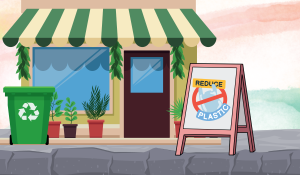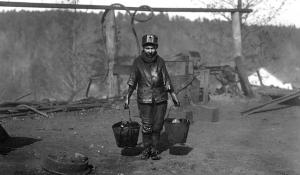
At the US’ Southern border, immigrant families are held for unknown amounts of time in facilities that are often grossly overcrowded and understaffed. Across the country, citizens in prison face similar conditions. What these facilities have in common is that they’re both private prisons. Private prisons hold about nine percent of the nation’s total prison population and about 73 percent of immigrant detainees, reports the New York Times.
This year, banks responded to wide-spread pressure from social justice groups, corporate responsibility organizations (including Green America REAL GREEN Investing and our ally the Interfaith Center on Corporate Responsibility), and shareholders. Wells Fargo, Bank of America, SunTrust, JPMorgan Chase, PNC, BNP Paribas, Fifth Third Bancorp, Barclays, and U.S. Bancorp all announced that they will no longer issue loans to the two largest private prison operators, CoreCivic and GEO Group.
By funding their operations, big banks have been complicit in the human crises that continue to unfold in private prisons. By the end of 2016, just four of those megabanks had $2.6 billion in lines of credit and loans invested in CoreCivic and GEO Group, according to In The Public Interest. That these banks will no longer be issuing new loans or lines of credit to private prison companies is a huge win for activists and organizations that have been pushing for banks to take accountability.
GEO Group and CoreCivic are contracted by US Immigration and Customs Enforcement (ICE), the Federal Bureau of Prisons, and the US Marshals Service to run facilities that hold immigrants. Private prison operators earn substantial profits from detention as the number of detainees increases.
There are a growing number of reports of inhumane conditions in these facilities, especially as such a high percentage of immigrants are placed there. Some of these conditions are violations of human, civil, and political rights outlined by the United Nations. There is now a class action lawsuit that was filed in Los Angeles this August on behalf of 55,000 people in ICE detention centers, alleging severe mistreatment, including in facilities run by GEO Group. Twenty-four people have died in ICE facilities since Donald Trump became president, according to an NBC News analysis of federal data.
Though eight banks have bowed to pressure from justice reform groups and concerned investors, five smaller banks have not yet made the commitment: Regions Financial Corporation, Citizens Financial Group, Pinnacle Financial Partners, First Tennessee Partners, and Synovus Bank.
Following the momentum of the megabanks’ announcements, Green America joined a coalitional letter to urge these five banks to thoroughly review the human rights impacts of their financial ties to private prisons.
Companies Profit from Prison & Detention Centers
Private prisons hold roughly nine percent of the US incarcerated population, but almost three quarters of people detained by ICE are held in privately funded facilities. Of those, most are run by CoreCivic and GEO Group, showing the companies’ dominance in the private prison sector and their reliance
on tough immigration policies.
“In memos to their shareholders, both companies [GEO Group and CoreCivic] acknowledge that policies with the potential to reduce the US detainee population constitute potential risk factors to their business model,” according to an August 2019 report from the Center for American Progress.
“Over the last 5 years, the American Friends Service Committee (AFSC) has been putting together a map of the prison industry as a whole, which is not just the companies that operate private prisons but all of the companies that profit from mass incarceration,” says Dalit Baum, director of economic activism at the AFSC. “Despite the fact that the majority of US prisons are publicly run, the entire system is deeply privatized, from bail bonds, to telecoms, to food services.”
The AFSC built a free online divestment platform called Investigate, which allows people to scan their investments for companies with ties to the mass incarceration and detention industries, and take action. You can find it online.
Banks Change Policy, An Important First Step
In response to organized campaigns, public outcry, and banks’ own risk assessments, more financial institutions are stopping new investment in for-profit private prisons. All banks that have committed to this have also agreed to fulfill their current contracts, some of which won’t expire until 2024 or 2025.
“It’s hard to describe this in terms of divestment because what the banks have said is that they will no longer extend credit,” says Nadira Narine, senior program director at the Interfaith Center for Corporate Responsibility (ICCR).“On the asset management side, all of these companies still invest their clients in GEO Group and CoreCivic, so in terms of equities they’re still very much invested.”
The private prison sector is already feeling the impact of the eight banks’ decision to stop issuing future loans. In October 2019, TruthOut reported that GEO Group had officially run out of banks to borrow from, representing an 87 percent drop in funding.
Move Your Money
As the megabanks continue to fulfill their current contracts to prison companies, one big way concerned investors and activists can take action to end the private prison system is to use Green America’s Get a Better Bank directory to find community development financial institutions that do not support for-profit prisons.
Some CDFIs, like Self-Help Credit Union, even work to have a positive impact in the justice system, instead of simply not having a negative one. One way they do that is by working with legislators to end the cash bail system.
“Much like payday lending, cash bail results in creating a cycle of poverty among those with the least financial means,” says Jennifer Marsh, executive staff at Self-Help Credit Union. “Being incarcerated for as little as 24 hours can lead to job loss, lost custody of children, and increases the chances a person will have future involvement with the criminal justice system.”
For more information on divestment from for-profit prisons and fossil fuels, read our article “Taking Stock of Divestment Movements." Individually and collectively, our economic actions make a difference every day and can bring us closer to the kind of world we need in which all communities are healthy and safe.







